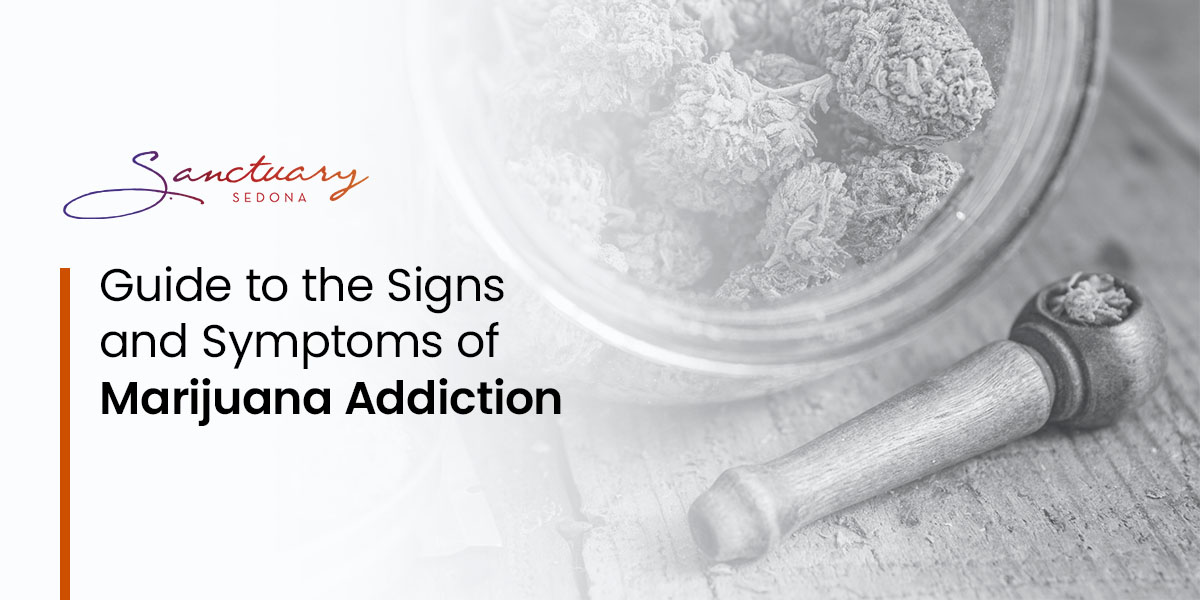Cannabis, also known as marijuana, is a psychoactive drug from the plant of the same name. It’s one of the most common illicitly used drugs in the United States due to its pleasurable effects on some users. However, recreational use of marijuana has been associated with physical dependence, withdrawal syndrome and addiction in severe cases.
Many people who use marijuana can develop cannabis use disorder, severely impacting their health and relationships. If you or a loved one are struggling with marijuana addiction, several treatment options can help. Learn the signs of marijuana addiction, causes and treatment methods below.
Signs and Symptoms of a Marijuana Addiction
The signs and symptoms of marijuana abuse look different for everyone and depend on certain factors. The definition of marijuana addiction is the compulsive urge to obtain and use marijuana no matter the consequences. A person may have cannabis use disorder if they display signs such as:
- Using more cannabis than intended.
- Trying and failing to quit using marijuana.
- Spending a significant amount of time using marijuana.
- Experiencing drug cravings.
- Continuing marijuana use even when it negatively affects school or work performance.
- Frequently using marijuana despite social or relationship problems.
- Using marijuana in high-risk situations, such as while driving.
- Needing greater concentrations of marijuana to experience a high.
- Experiencing withdrawal after stopping marijuana.
Whether eating, drinking or smoking weed, addiction symptoms look the same. There are some common indicators that a person has misused marijuana and may develop an addiction. The more of these symptoms they display, the more likely they are to abuse the drug or engage in similarly risky behavior. Signs of weed addiction might include:
Behavioral Symptoms
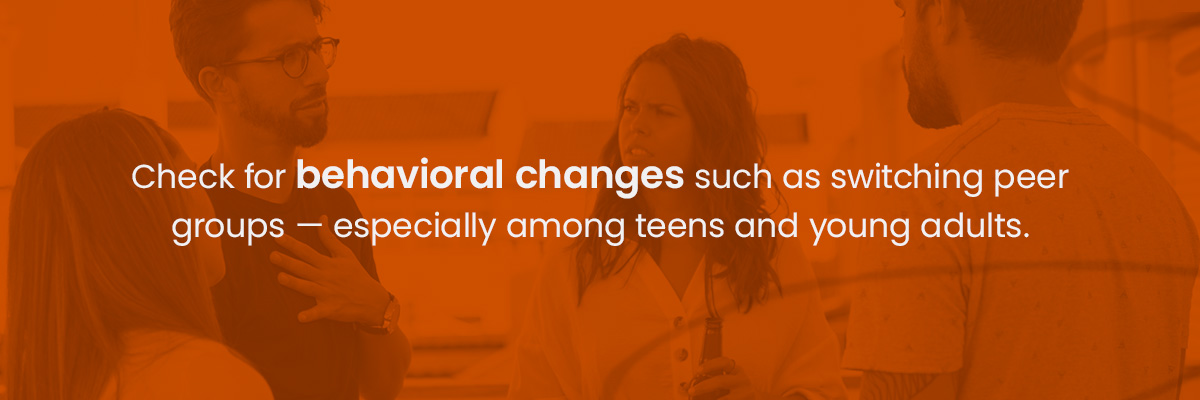
When a person develops marijuana addiction, you’ll notice characteristic behavioral changes that may impact their careers, social interactions and relationships. If you’re unsure whether you or a loved one is abusing marijuana, check for behavioral changes such as:
- Switching peer groups — especially among teens and young adults.
- Withdrawing from family members and previously close friends.
- Unexplained declined work performance.
- Deceptive actions such as lying or keeping secrets.
- Eating binges, particularly involving unhealthy or fast food.
- Neglecting grooming and personal hygiene habits.
- Possessing drug paraphernalia such as water bongs or small pipes.
- Fits of extreme talkativeness or laughter.
Physical Symptoms
Within a few minutes of inhaling marijuana smoke, a person will experience elevated heart rate, relaxed breathing and enlarged eye blood vessels. A person’s heart rate might even double and reduce the blood’s capacity to carry oxygen when ingesting marijuana. The physical symptoms associated with marijuana use include:
- A decline in coordination and perception
- Poor reflexes or slow response time
- Fatigue and lethargy
- Weight gain
- Increased heart rate and high blood pressure
- Dry mouth
- Hypotension or dizziness
Cognitive Symptoms
Cannabis use has been shown to impair cognitive functions on several levels — from essential motor coordination to complex executive function tasks, such as planning, organizing, solving problems, making decisions and controlling emotions and behavior. These symptoms vary in intensity depending on how recently the person ingested marijuana, the amount taken and the duration of the addiction.
Due to these issues, individuals who struggle with cannabis use disorder have trouble learning and applying skills for a successful recovery. Some of the initial cognitive symptoms of marijuana use include:
- Confusion
- Disorientation
- Sensory distortion
- Inability to express coherent thoughts
- Inability to focus or concentrate
- Impaired memory
- Difficulty tracking the passage of time
Psychosocial Symptoms
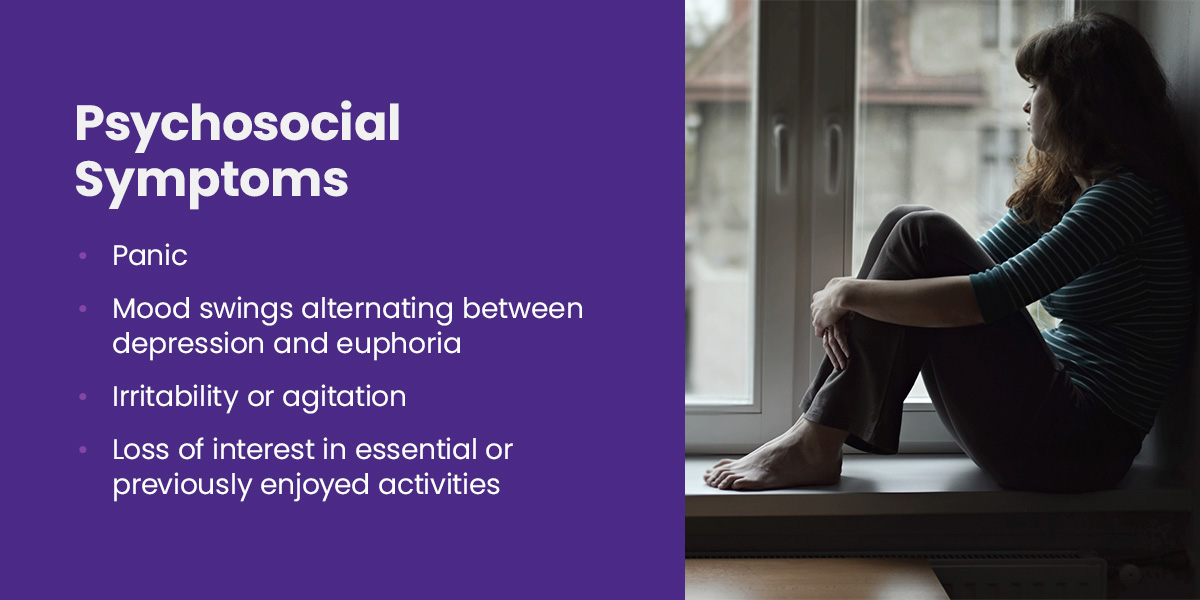
When taken frequently or in high doses, marijuana use can cause symptoms of mental illness. Even the initial effects can lead to disorientation and sometimes anxiety or feelings of paranoia. Other psychological effects can include:
- Panic
- Mood swings alternating between depression and euphoria
- Irritability or agitation
- Loss of interest in essential or previously enjoyed activities
Causes and Risk Factors of a Marijuana Addiction
Substance use disorder is a complex disease with a wide range of causes. While people of any age, sex or economic status are at risk of developing addiction, researchers believe a combination of genetics and environmental factors can affect this likelihood:
Genetics
Researchers have discovered a link between drug abuse and family history, where individuals struggling with addiction also had close family members who abused or became addicted to drugs. This suggests specific genetics may play a role in the development of addiction.
For instance, scientists found those with high sensation-seeking traits to be more likely to misuse substances and become vulnerable to addiction. In other words, those with a strong desire for new experiences and a willingness to take risks to experience a thrill were more prone to develop behavior associated with human addiction. The findings suggest that people with risk-seeking behavior are more likely to lose control over their drug intake and develop a habit.
Additionally, every person’s body responds differently to drugs and medication. Some may find marijuana pleasurable and helpful for self-treating their mental illnesses or chronic pain. Others might experience paranoia or anxiety from using cannabis. These differences can come down to differences in genes. A vulnerable person might prefer certain substances and experience extreme withdrawal symptoms when trying to quit. On the other hand, those less vulnerable might feel no pleasure from a drug that makes others euphoric.
Environmental Factors
High-risk environments can influence people to use substances, such as easy access to marijuana or unavoidable interactions with people struggling with addiction. Lack of parental supervision in childhood is also linked to substance use disorder.
Some addicted individuals may have experienced pressure from friends or family members to use marijuana. Others might have been exposed to marijuana from a young age and developed an addiction unknowingly. And when a person is surrounded by cannabis use at school, they may be more likely to use it themselves, leading to misuse and addiction.
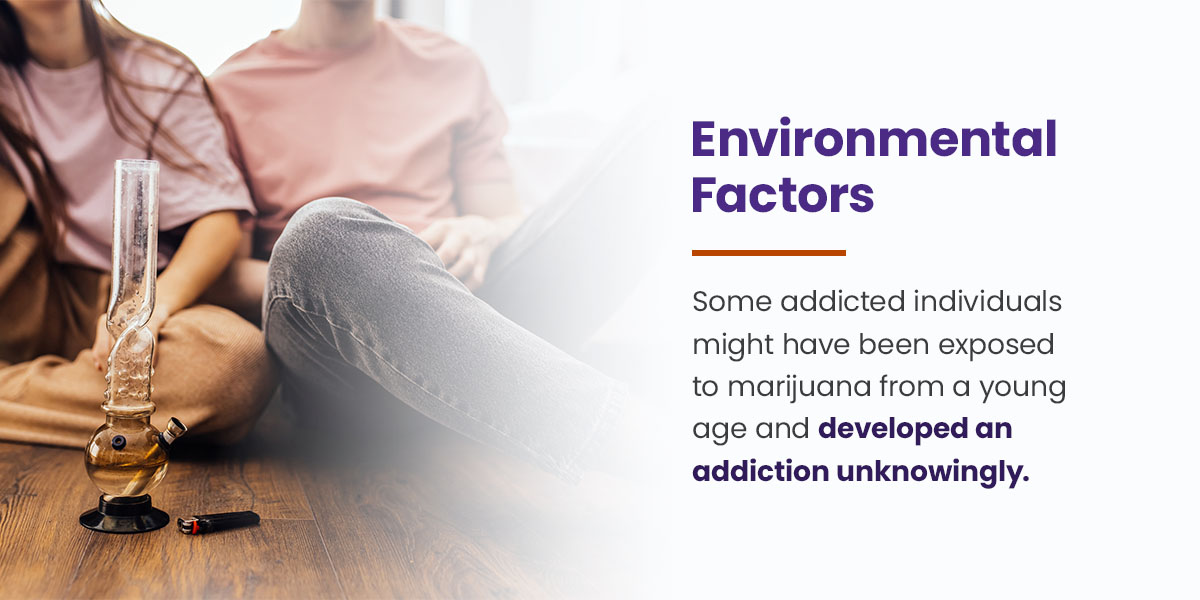
Other external factors of addiction can include living in poverty or experiencing community crime and violence. Residing in this environment can cause chronic stress due to dealing with economic strife or being constantly exposed to violence. Many may turn to substance use as a coping mechanism to deal with stressors and find it difficult to escape the cycle of addiction the longer they reside in a chaotic environment.
Additionally, similar to the above, stressful life changes might lead to the development of mental illnesses, which can often contribute to unhealthy coping mechanisms and substance use disorders. Life stressors and changes might include the loss of a job, the end of a relationship or the death of a loved one.
Effects of Marijuana Addiction on Your Life and Those Around You
Marijuana use disorder puts people at risk of short and long-term health effects. Additionally, frequent cannabis use can cause a person to experience occupational setbacks due to poor performance and a higher risk of legal troubles associated with drug use and other reckless behaviors.
Depending on the amount of marijuana a person uses and how long they’ve been using it, health effects can range from troublesome and temporary to damaging and permanent.
The following are some of the effects of marijuana abuse on your life and those around you:
Physical Health Dangers
While immediate physical symptoms of marijuana use can lead to elevated heart rate and impaired motor function, the long-term effects of addiction can be much more devastating. These physical health dangers can include:
- Hyper-inflated lungs
- Chronic bronchitis
- Sexual dysfunction
- Greater likelihood of heart attack
- Respiratory infections, such as pneumonia
- Weight gain and risk of obesity
- Broken bones, sprains or bruises due to sensory distortion and diminished coordination
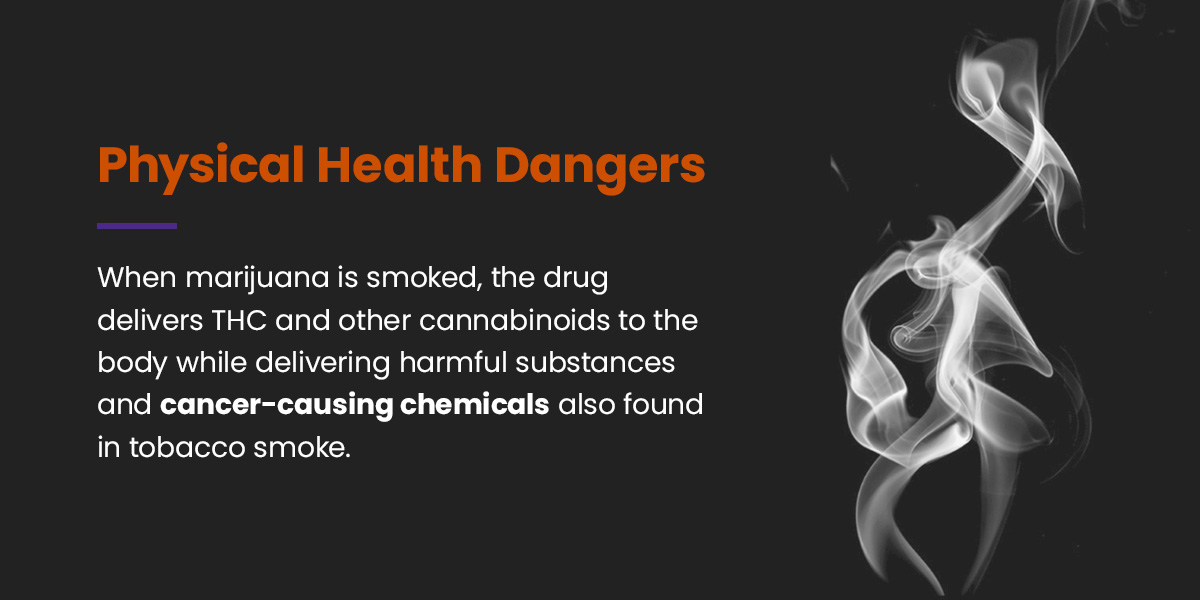
When marijuana is smoked, the drug delivers THC and other cannabinoids to the body while delivering harmful substances and cancer-causing chemicals also found in tobacco smoke. These substances are detrimental to the lungs and cardiovascular system. In particular, some studies have shown a link between marijuana use in young adults and an increased risk for testicular cancer.
Studies have also reported that chronic marijuana use can lead to Cannabinoid Hyperemesis Syndrome in rare cases — characterized by severe nausea, vomiting and dehydration. This condition can result in frequent emergency room trips, though symptoms may resolve when a person quits using marijuana.
Marijuana Withdrawal Symptoms
Long-term marijuana use can lead to dependence, withdrawal and addiction. Weed addiction vs. dependence can be tricky to identify. While dependence doesn’t always lead to addiction, it can increase a person’s risk of developing one due to the associated withdrawal symptoms.
Dependence occurs when the brain adapts to large amounts of cannabis by reducing the sensitivity to its neurotransmitters. This can cause a person to continually increase the amount of marijuana they take and lead to withdrawal symptoms as the brain attempts to readjust after quitting the drug.

Withdrawal symptoms appear within one week after the person stops using marijuana. Marijuana withdrawal symptoms can include:
- Feelings of anger, irritability or aggressiveness
- Sensations of extreme nervousness or anxiety
- A decrease in appetite that may cause significant weight loss
- Abdominal pain
- Fever
- Chills
- Sweating
- Headache
- Tremors
- Cravings
- Feelings of restlessness
- Onset feelings of depression
- Disruptions to sleep such as insomnia, disturbing dreams or nightmares
Withdrawal is often a primary reason people continue marijuana misuse. They may fear the uncomfortable and painful symptoms of quitting marijuana and spiral further into their addiction without seeking help.
Psychological Effects
Those who succumb to marijuana addiction are more likely to develop temporary psychosis, or not knowing what is real. They’re also more likely to develop long-lasting mental health conditions like schizophrenia. Long-term cannabis use has also been linked to the onset of depression, social anxiety and thoughts of suicide. And when a person already has co-occurring mental health disorders, marijuana use can exacerbate the symptoms.
The risks of marijuana addiction during adolescence can also include altered brain development. THC can disrupt the brain’s development process and decrease neural fibers in specific brain regions. Researchers have also discovered that frequent marijuana use is linked to lower IQs and increased feelings of depression or anxiety in young adults.
Social Effects
In addition to addiction’s physical and mental effects, substance abuse can lead to social isolation and severely impact relationships. Individuals struggling with marijuana addiction may experience unpredictable mood swings and lash out at those closest to them. Addiction can also result in depression and anxiety, making it harder for individuals to seek help or be around friends and family members.
Additionally, addiction can lead to deceptive behaviors and cause a person to steal money from family members or lie about their behaviors. This can create a rift between the individual and their loved ones, resulting in social isolation and worsening addiction.
Marijuana Addiction and Co-Occurring Disorders
Researchers have noted how cannabis use can contribute to mental health problems, while a diagnosis of mental illness also increases the risk of addiction. More than 17 million people experienced mental illness and substance use disorder in 2020. Users can have trouble pursuing and reaching long-term sobriety without treating co-occurring conditions. Co-occurring disorders can include:
Mental Health Conditions
Many people who use marijuana attempt to self-medicate their depression and anxiety without realizing the risk of dependency and the effect that marijuana can have on their symptoms.
Those with severe mental illness often use cannabis at higher rates than the general population, while those who use marijuana have a higher likelihood of various long-term mental effects.
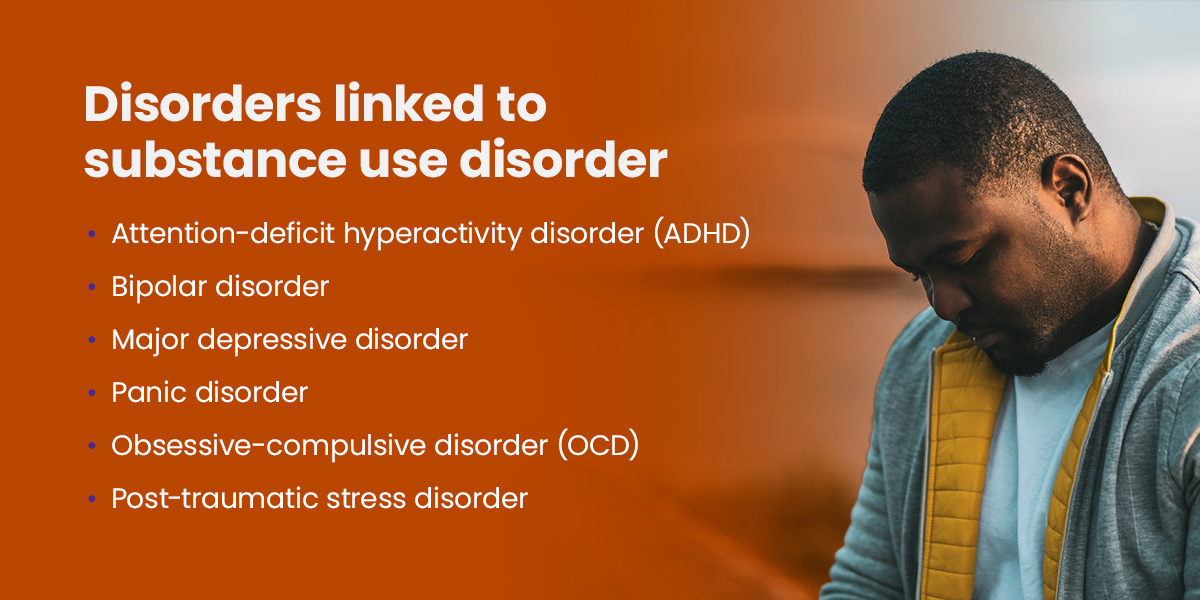
Some of the disorders linked to substance use disorder include:
- Attention-deficit hyperactivity disorder (ADHD)
- Bipolar disorder
- Major depressive disorder
- Panic disorder
- Obsessive-compulsive disorder (OCD)
- Post-traumatic stress disorder
One animal study found that cannabinoid-induced neural circuit dysfunctions were similar to patients with severe mental illnesses. Scientists found that THC exposure increases neural noise, which can cause psychosis-like symptoms. The changes caused by THC can also significantly impact patients with schizophrenia by causing hallucinations, paranoia and disorganized thinking, especially when taking high-potency marijuana.
While these co-occurring disorders are often reported alongside chronic marijuana use, research has not determined whether marijuana causes these symptoms or is associated with mental health conditions. Many people who use marijuana use it to alleviate the symptoms of their mental illness. External factors can worsen stress and lead to substance use disorder and other mental illnesses.
Chronic Pain
Additionally, many people may use marijuana to treat chronic pain or migraines. Chronic pain is persistent pain lasting 12 weeks or more, often caused by an injury or underlying health condition. Chronic pain can affect stress sensitivity, cause mood swings and decrease mobility leading to a higher risk of abusing marijuana and other substances.
Many have combined opioids and marijuana to self-treat their chronic pain, often with detrimental effects. Research shows patients are at an elevated risk of anxiety and depression and addiction to tobacco, alcohol, cocaine or sedatives when combining these substances to self-medicate. Since the benefits of marijuana for chronic pain are largely inconclusive, it can be more helpful to consult with a doctor and try over-the-counter pain relievers or physical therapy to alleviate pain.
Can You Recover From Marijuana Addiction Disorder? What Treatments Are Available?
Perhaps you started using marijuana as a teen and can’t kick the habit. Or, maybe it helped your anxiety, and you’re fearful that quitting will cause your stress and anxious thoughts to return. Fortunately, these problems can be treated, and so can a person’s genetic tendencies toward addiction.
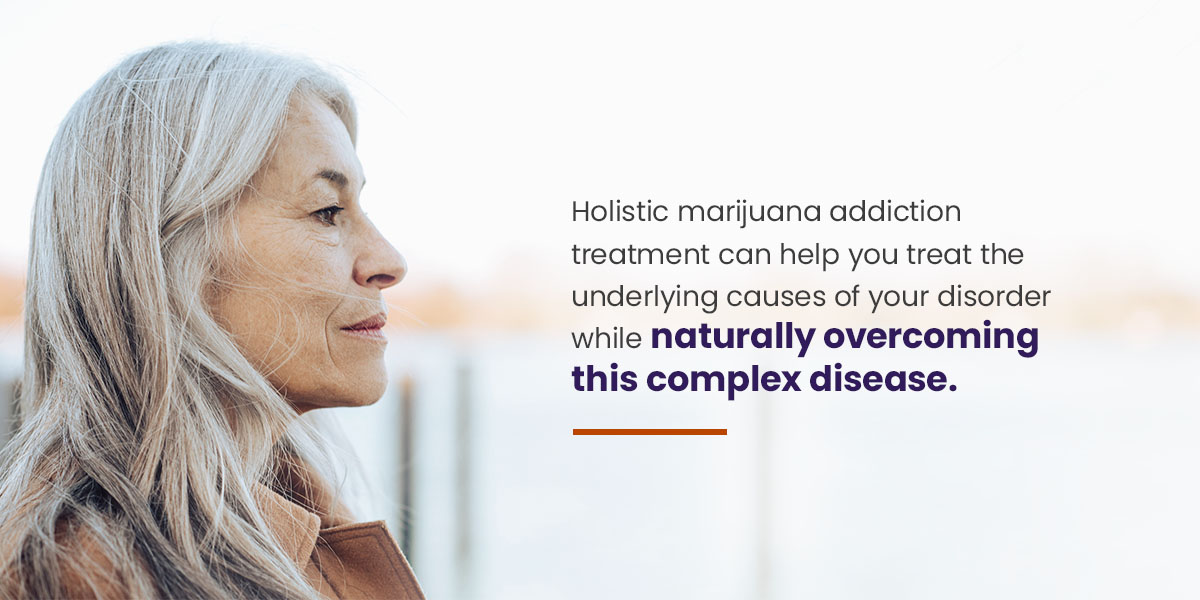
Epigenetics is the emerging science that discusses how we can influence our genetic expression through behavioral and environmental changes. When a person attends behavioral therapies, they’ll work on “training” their brain to achieve a successful recovery. Holistic marijuana addiction treatment can help you treat the underlying causes of your disorder while naturally overcoming this complex disease. While treatments offered in holistic care centers vary, generally, they’ll include the following natural remedies:
Substance Abuse Mental Health Services
At a holistic healing center, you’ll work with health professionals to determine the potential causes of your substance use disorder. Since marijuana use disorder is often linked to co-occurring mental health disorders, you’ll learn healthy coping mechanisms to deal with stressors and avoid addiction triggers through cognitive-behavioral therapy.
Cognitive-behavioral therapy can help you treat underlying mental health conditions that may contribute to your addiction. You’ll learn the value of self-care and how to combat your fears to take back control of your life. Other forms of therapy often provided in holistic care centers include:
- Music therapy
- Expressive art therapies
- Movement therapy
- Sound healing therapy
- Eco-therapy
- Inner child therapy
- Body image therapies
- Individual and group process therapy
Nutrition Education and Exercise
Weed addiction treatment might also involve nutritional education and exercise to help you heal both mentally and physically. Substance use disorder tends to wreak havoc on the mind and body, and studies show that following a nutritional plan can alleviate depression and anxiety symptoms while restoring your body.
The Sanctuary at Sedona provides gourmet meals and nutrition education to improve your mood and help you approach the recovery process healthily. Exercise can be employed as a healthy hobby to replace substance use since it triggers feel-good chemicals like dopamine and serotonin. Following a healthy fitness plan can also strengthen your body, curb cravings and help you maintain your sobriety.
Yoga and Mindfulness Meditation
Yoga and mindfulness meditation can help clients alleviate symptoms of mental illness and provide clarity of mind. This way, you’ll achieve clarity of mind while relaxing the entire body.
Yoga is a practice that incorporates breathing techniques and body movements. It can help patients overcome stress-related anxiety, pain and substance use disorder by soothing the body and releasing feel-good chemicals.
Mindfulness meditation is another helpful practice that can help patients focus on the present moment to counter negative behavioral urges to use substances.

Marijuana Addiction FAQ
A few of the most common questions and our answers about marijuana addiction include:
1. How Can I Treat Marijuana Addiction Naturally?
You might naturally treat marijuana addiction through holistic healing methods such as cognitive-behavioral therapy, which has been proven to be a successful treatment method without using medicines. Holistic healing provides an integrative approach to treating addiction and any underlying conditions. These activities can help you reach sobriety and will support your ongoing care.
2. How Can I Help a Loved One With a Marijuana Addiction?
Research estimates that 3 in 10 people who use marijuana have cannabis use disorder. For those who use before age 18, the risk of developing marijuana addiction is even greater. It can be helpful to know how to support someone going through this debilitating disorder.
Extending your compassion and encouragement to a loved one struggling with marijuana addiction may be all that they need to seek professional treatment. It’s also important to remain non-judgemental and ask for ways that you might help them through the recovery process.
3. Can a Person Overdose on Marijuana?
An overdose occurs when a person takes a high enough amount of substances to produce life-threatening symptoms or death. There are currently no reports of people dying from marijuana use alone. However, those who smoke marijuana with higher concentrations of THC often seek emergency room treatment due to psychiatric complications. Long-term marijuana use has been linked to an increased risk of psychosis and schizophrenia.
Get Marijuana Addiction Treatment at The Sanctuary at Sedona
If you’re struggling with marijuana use disorder, several treatment options can provide much-needed relief. The Sanctuary at Sedona offers a comprehensive, integrative approach to treating marijuana addiction.
Our programs combine elements of peer-reviewed science and spiritual traditions to help you manage addiction and support your ongoing health and wellness. You’ll learn the underlying causes of your addiction and safely address your health issues in a supportive, intimate setting.
To learn more about our treatment process, contact us today!

